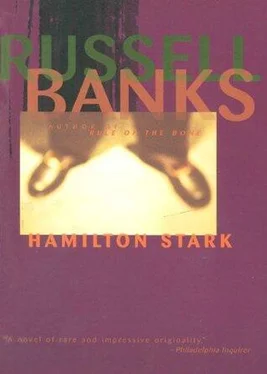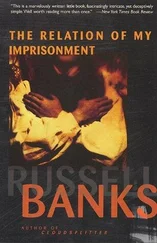Far out at the center of the river, where beneath the ice the water ran deepest and coldest, there were several clusters of tiny windowless huts. Inside each hut, a fisherman sat hunkered over a head-size hole cut in the ice, drinking whiskey and warming his red hands over an oil heater, each man closed into his own kerosene-lit world, as shut off from the others by the cold and the wind as planets in separate solar systems. And though their huts were clustered together in the same galaxy, the fishermen were together for no reason of comfort or sociability, but only because here, in this region, the river ran deepest and coldest and the fish would take the bait.
A little farther on there is a place, where the river is at its broadest and makes a long, slow sweep around a gently rounded plain, that has been marked by a plaque placed by the state historical society beside the road as it curves along the arm of the river. The plaque tells the traveler that there, in the spring of 1703, the first party of settlers in the town of B. spent their first night in the valley. There, on this slight swell of land, they made camp, and the next morning, as dawn broke and the mist lifted from the river and the trees turned gold in the hazy sunlight, the settlers were surprised by a war party of Abenooki Indians and in the ensuing battle lost one of the original incorporators, a man named Lemuel Stark.
By the time I reached the outskirts of the village, where the river narrows to rapids and the mills were built, the grist-mill, the sawmill, and later, in the nineteenth century, the shoe factory, now a storehouse for a local well-drilling company, the snow had started to fall densely, in semitransparent curtains down and across my field of vision like veils dropping away first to reveal a face and then to cover it.
At the Parade, the large common square of ground at the center of the town, as I approached the Congregational church and the turnoff to Blue Job Road, I saw the police chief’s car, Chub Blount’s Plymouth station wagon with its blue glass bubble on top, come out of Blue Job Road, turn onto the main road, and pass swiftly by me, heading in the direction I had just come from. The snow was falling too heavily now for me to have seen his face as he passed, but I recognized his white Stetson hat and saw that he was alone. A few seconds later, I was passed by another car with a blue glass bubble on the roof, this one driven by the chief’s assistant, Calvin Clark. I assumed that the two had come directly from A.’s house, and I responded to the fact that they both were alone with a peculiar mixture of relief and disappointment — relief that they apparently had not found A., or if they had, that they had not arrested him; and disappointment because, if they had failed to locate him at his house, then how could I expect to succeed? Of course, it was also possible that they had found him after all, had found his body, that is, and thus had no reason not to be alone as they drove back to town. But then, I reasoned, I would have seen only one of the two police officers, for surely Chub would have left Calvin back at the house to watch over A.’s body and to make sure no one tampered with or accidentally disturbed the evidence.
But evidence of what? I asked myself. How do I know a crime’s been committed? Maybe nothing unusual or disastrous had happened to anyone —not to Dora, not to A., not to Chub Blount, not even to me —and maybe the chief and his assistant had not even been at A.’s house in the first place but had been out on Blue Job Road this snowy morning on some other and wholly unrelated police business. Quickly, I ran down the bits of evidence — the three bulletholes in the car window, the strange circumstances of the car’s presence and A.’s absence, with all the doors of the house locked, the gate closed, and even though yesterday had been a Sunday, week’s end, the absence of any freshly tossed out trash at the edge of the field in front. Yes, it’s true, I thought. It’s true. The evidence points with equal force to numerous conclusions, and many of the conclusions do not constitute crimes or disaster or even anything especially unusual whether in A.’s life or Dora’s or Chub’s, or my own. As I slowed the car to make the turn at the church onto Blue Job Road, I finally admitted to myself that, yes, I may have made the whole thing up. I may have imagined everything.
But then, as soon as I was on Blue Job Road, I started to laugh at myself, not out loud, but with a low, ironic giggle. An hour before I had been wondering seriously if the whole thing, this very thing I was now afraid I had imagined, had been engineered by A. I felt light-headed, almost giddy. This was self-mockery taken to the edge of hysteria.
By then the snow had covered the road sufficiently to obliterate any trace of its surface, and I was only able to keep to it by following the high banks of old, ice-hard snow on either side. The windshield wipers clacked back and forth, cutting a pair of half-moons for me to peer through. In a few seconds I entered the short stretch of the road where the conifers grow to the very edge of the road, their branches interlacing between them and across the road above me, making a rough, dark tunnel and it seemed suddenly that it was no longer snowing and a great arching space had opened around me. The woods here, most Scotch pine and dark spruce, grew scruffily into the shaggy wall of an outdoor cathedral, and I remembered then that it was there, just yesterday afternoon, that I had looked hopefully for the figure of Rochelle, as if she were a sister or daughter whose recent death I still mourned and had not yet accepted as real, whose familiar form and hair and green, hooded loden coat my eyes still habitually searched for.
Then, as quickly, I was out of the wood and into the snowstorm again, peering anxiously through half-moons, aiming the car rather than driving it, for the road was slightly slippery under my tires. I passed several battered house trailers and tarpaper-covered shacks, the homes of A.’s neighbors, barely glimpsing them through the falling snow, noticing only that, covered with the layer of fresh snow, the buildings and the cluttered yards looked cleaner, more orderly, as if the snow could tend to them more capably, more energetically, than could the inhabitants.
A few seconds more, and I slowed the car and turned onto the lane that led to A.’s house. I glanced over at the large, hummocky field in front of the house and saw that it, too, had been transformed by the fastidious care of the falling snow, had been made over to look more like a natural, cleared meadow in winter than an open dump, a private trash receptacle.
When I drew up to the gate and prepared to stop so that I could get out and open it, I saw, with surprise, that the gate was wide open already. Hadn’t I remembered to close it the day before? It was enough of a habit that I didn’t have to think consciously of it in order to close it after passing through, therefore I couldn’t be sure. Was this “evidence” of anything — that the gate, normally closed, was now invitingly wide open? I looked up the long driveway to the house and garage. Everything was as I had seen it yesterday afternoon — A.’s Chrysler parked facing the closed garage door, the house darkened and apparently empty, the large expanse of smooth, freshly whitened yard encircling the house from the fence down in front to the woods in back, and beyond those woods, the rising shape of the mountain. No, except for the new pelt of snow and the open gate, everything was the same. Everything.
Very slowly, the snow creaking under my tires, I drove up to A.’s car and parked directly behind it. Then I got out of my car and walked around to the window at the driver’s side of the Chrysler. There they were, the three bulletholes connected by a network of tiny cracks, like spider webs. I touched each of the holes with my finger. One of them unexpectedly crumbled at the edges from the pressure, and my finger poked into the cold interior space of the car, startling me. Frightened by something nameless, I quickly withdrew my finger and nervously yanked on my gloves.
Читать дальше












